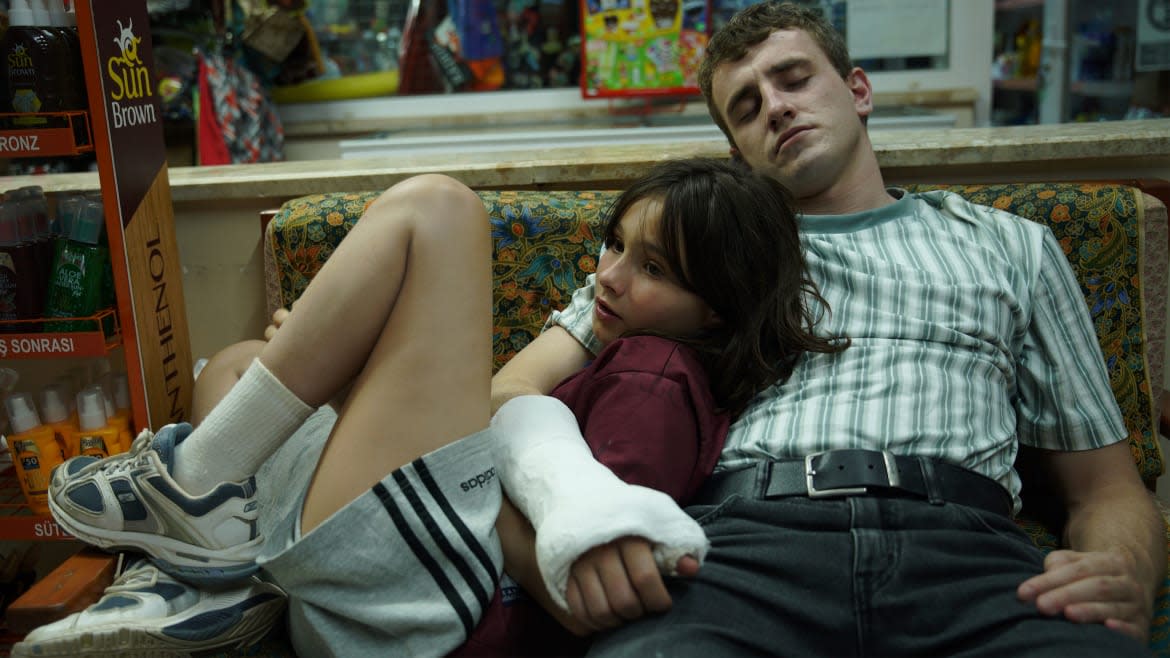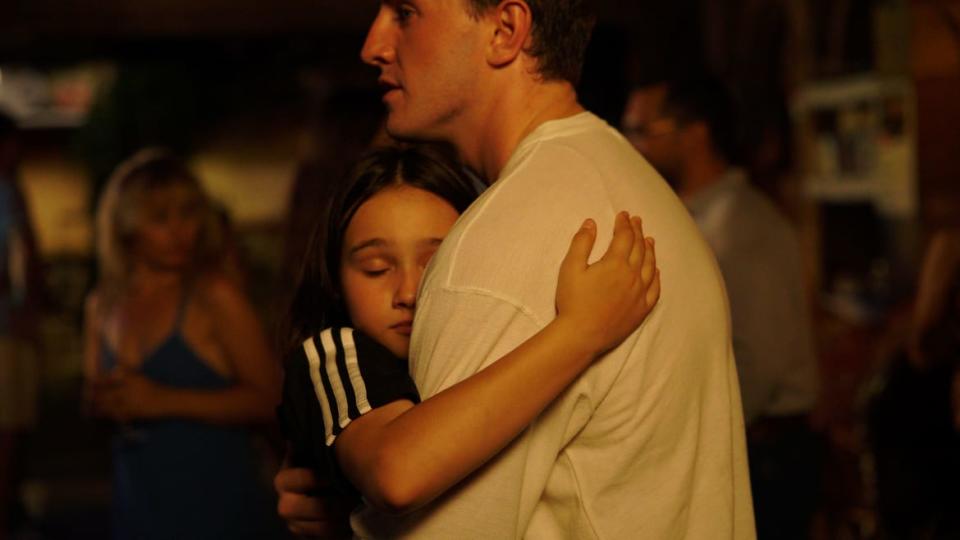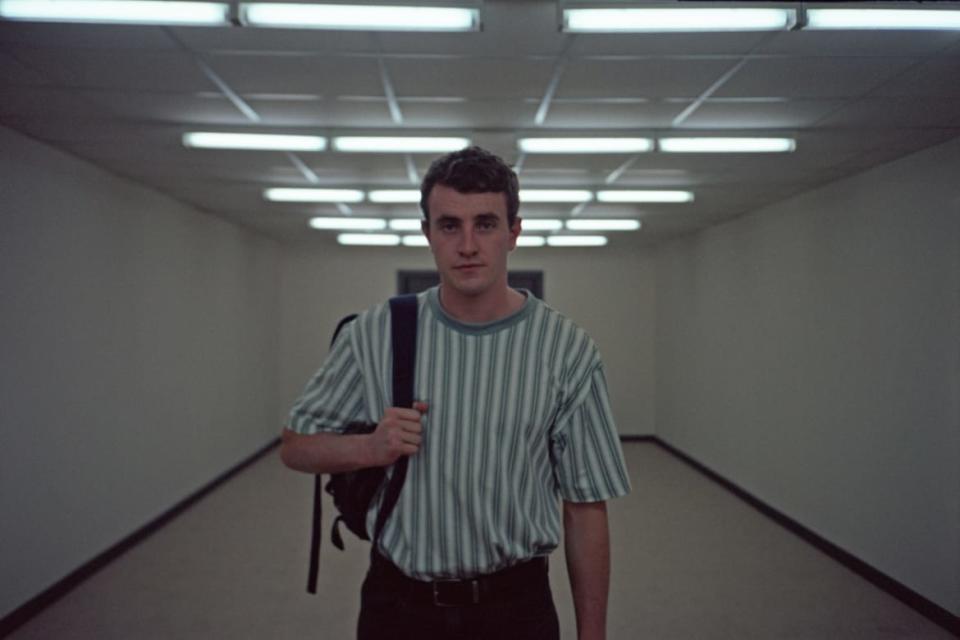Paul Mescal Will Make You Cry Over and Over and Over Again in ‘Aftersun’

It’s fun to see the world through the eyes of a 12-year-old again. We were all once this young, and although Aftersun centers on a specific young girl’s memories, the story taps into a tenderness that many (hopefully, all) can recall. Yapping in disgust over oily sunscreen. Over-chlorinated water shooting up into nostrils, burning your brains out while playing pool games. Kiddy mocktails. Laughing at dad’s bad dance moves, half-embarrassed, half in adoration.
Charlotte Wells’ debut feature traces back through the director’s similar memories with her father, an “emotional autobiography” constructed via old camcorder tapes and whatever tiny scenes her brain can spit up. Her avatar is a girl named Sophie—played by both a buoyant young Frankie Corio and Celia Rowlson-Hall, watching from afar in her older years—who takes a summer vacation to Turkey with her father, Calum (Paul Mescal).
Except Calum isn’t really a father; he is, distinctly, a dad. Mescal moves like a young dad with every step: awkward to us normal onlookers, but like a god to his sweet little daughter. He oscillates between calling Sophie “bub” and “poppet.” It can’t be easy to make Paul Mescal, the sensitive hunk from Normal People and boyfriend of Phoebe Bridgers, totally unattractive, but cargo shorts do the trick. He’s a dad, and a dad on vacation at that, just like any old, sweaty-chested fella you’d see in line for the teacups at Disney World.

There’s little in the way of plot in Aftersun. In that way, it’s reminiscent of the film Somewhere, Sofia Coppola’s similar ode to father-daughter relationships. (The two films are so alike, in fact, that Calum’s broken arm cast resembles that of Somewhere star Stephen Dorff’s. What’s with estranged fathers twisting their wrists?) But herein lies the joy of hanging out with dads: There’s no rhyme or reason to what they do, no well-adjusted schedule, no three-act structure. Dads come with ups and downs, just like adolescence, a tumultuous ride that Wells captures perfectly in its looseness.
Instead, Aftersun reads like a book of short essays all themed around one trip to Turkey. Sometimes, Sophie leaves her father’s side, playing pool with a batch of older teenagers or sneaking off to share a kiss with her video game-loving resort boyfriend. Calum runs off on his own adventures too, although since the film is based on Sophie’s memory, these scenes are likely constructed on imagination. What, exactly, was Dad up to during our trip, all those years ago? Was he at the club? Was he diving, butt-naked, into the Black Sea?
Paul Mescal Enchants as a Goofy, Brooding Dad in ‘Aftersun’ Trailer
But the most tender moments of the film are those between Sophie and Calum together, especially ones seen through the nostalgic lens of old camcorder tapes. Corio and Mescal actualize a stunningly real relationship together, their chemistry as father and daughter dotted with every detail imaginable. Sophie wants to paint the walls at her father’s place yellow. He obliges, sort of, but accuses her of roping him into something to which her mother wouldn’t agree. Sophie simply giggles in response. This feels so familiar—I also begged my dad to give me a yellow room at his place. (He let me have one. It was glorious.)
There will likely be other aspects of Aftersun viewers will find charmingly familiar—like Sophie’s obsession with a motorcycle arcade game or the baggy outfits her dad continues to make her wear. Those dirty white sneakers Sophie wears are certainly indicative of a dad vacation. Aftersun is brilliantly attentive to the particulars of Sophie’s adolescence, especially as a young girl, examining her ticks and wide-eyed optimism. The way Sophie looks at her dad, who certainly doesn’t have it all figured out, is the same gape we might have at a steaming bowl of creamy tomato soup on a chilly day. He’s everything to her: comfort, inspiration, solace, warmth, life.
Until he isn’t. We don’t know the exact backstory of how 30-year-old Calum became such a young father, but it’s certainly not bright. Glimpses arise in the way he talks about his and Sophie’s uncertain future together, his empty monetary promises for voice lessons, and the fact that all the other kids but Sophie seem to have access to all-inclusive wristbands. Instead of buying Sophie one of the wristbands, Calum opts for a pricey Turkish rug. Sophie offers up quiet petitions for him to come visit more, nudging him with guilt by saying she misses him. The illustration of their estrangement is never heavy-handed—Sophie isn’t yelping about Dad “never being around,” the sort of fatherhood cliché this film avoids.
Instead, Sophie conveys her complex feelings for her father in much more implicit ways. Sophie likes looking at the sky, for example, because it’s the same cloudy day that her dad is seeing: “Even though we’re not together, we kind of are in a way,” she says, lounging on a pool chair. “We’re both under the same sky. So, together.”

Cue the throat lump. I found that, throughout Aftersun’s quick hour-and-a-half runtime, tears pressed against my eyelids, never quite falling all the way. My throat hurt from holding back the constant urge to cry. But alongside the delicate sadness of a child who’s fallen away from a parent—or vice versa—there were glimmering pockets of happiness, which were often even more affecting than the somber moments. Aftersun is an emotional ride; even if it is quite heavy-hearted, it’s good to leave a film knowing it made you feel so deeply.
While the first 75 minutes or so of Aftersun are spent poking at the lump in our throats, the final scenes take a hammer to it. There’s a stunning dance sequence near the end set to “Under Pressure” by Queen and David Bowie, which flickers between past and present versions of Sophie as she watches her father. It’s fantastic, but nothing stuck with me quite as much as the less fantastical moment preceding this: Sophie and Calum gaze at each other, with smiles on their faces and sobs threatening to eke out, while waving goodbye at the airport.
There’s this feeling that’s hard to describe, which this film perfectly taps into. It’s the feeling you get when you’re saying goodbye to someone you believe you’ll see again soon, but you’re still sad you’ll have to leave their side for a bit of time. It’s not a feeling that’s heavy enough to cry over—it’s not like someone’s just died—but you can’t get over the fact that you’ll be alone, without them, after spending so much time with them. The ending of Aftersun emits this specific grief. I felt this way about leaving Calum and Sophie as the credits rolled.
Aftersun premieres in theaters on October 21.
Get the Daily Beast's biggest scoops and scandals delivered right to your inbox. Sign up now.
Stay informed and gain unlimited access to the Daily Beast's unmatched reporting. Subscribe now.


